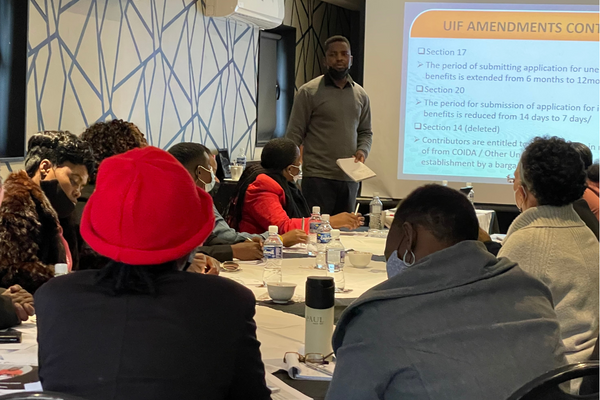In 2023, care work remains the unpaid responsibility of women. Both women and men report that the biggest barrier for women in paid work is the struggle to balance it with family responsibilities. Many parents, particularly women, are still not afforded adequate social protections when it comes to pregnancy and childcare.
Anecdotal evidence from women involved in Labour Research Service (LRS) programmes points to the fact that employers continue to see childbearing as a negative interruption and are dissuaded from employing young women. Even though South Africa has labour laws protecting pregnant women, and the Labour Relations Act specifically mentions that an employer is not entitled to dismiss an employee due to her pregnancy, pregnant women still report cases of contracts being terminated.
Not only do pregnant women experience issues, but also those who are primary caregivers. Many informal economy workers work under very unfavourable conditions with no proper infrastructure. Women in particular often bring their children along to work with them in conditions where there are no proper shelters, or where no proper toilets, water or garbage collection points exist. Addressing these unsafe and unhealthy working conditions is essential for decent work to prevail.
South Africa’s social protection policies are aimed at reducing vulnerability and assisting women to stabilise incomes in the event of unemployment, employment injury, disability, sickness, and maternity, and by ensuring that they have at least a basic level of income security. The Amendments to the Unemployment Insurance Agency (UIA) signed into effect on 18 January 2017 state that a beneficiary for maternity payment is an employed person who has been employed for at least 13 weeks. Another significant amendment is the shift from a sliding scale to a fixed rate of 66% payment of the earnings of the beneficiary at the date of the application. While these amendments make the UIA compliant with the ILO Maternity Protection Convention 183 (2000), article 16(1) of the 2014 SADC Protocol on Employment and Labour, and the 2007 Code on Social Security in the Southern African Development Community (SADC), there remains the challenge of providing women with an unrestricted entitlement to maternity benefits (Olivier and Govindjee, 2015).
The UIA introduces a shorter and what appears as a reasonable qualifying period of 13 weeks, but a woman can only claim the maternity payment based on her acquisition of contribution credits i.e. the benefit is based on the number of days of work. There is therefore no minimum period of payment benefits if a woman has not accumulated enough credits, restricting entitlement to the contribution of the individual woman and not as part of a social contribution of all employed men and women.
All unemployed women, women working in atypical forms of employment or in situations where employers are not compliant with the UIA remain excluded from any form of maternity protection. For maternity benefits to be an unrestricted right, and the extension of the benefits to unemployed women, continues to be a challenge. When contributory schemes like unemployment insurance or maternity payment are linked to formal employment, women are less likely to benefit from these forms of social protection.
As women bear the overwhelming responsibility for unpaid work such as domestic work and care work, their patterns of employment are irregular and they are less likely to be covered by contributory social insurance schemes as compared to men. Employed women on average earn less than employed men resulting in lower levels of benefits. In 2003 South Africa extended unemployment benefits to domestic workers but to date very few employers are compliant with this legal obligation.
The Child Support Grant of R350 per child reaches over 12 million children with the majority of the recipients being women living in female headed households. The women receiving the grants are responsible for the food, shelter, clothing, education, health, and other aspects of the child’s maintenance – all unpaid care work. So, while the Child Support Grant provides for the dependent children of people who are unable to support the child, it does not provide for the adults carrying out this support, the vast majority of whom are women. This leaves the caregiver with no means to support themselves (Beth, 2014). There remains a perception by many that the child support cash transfer is a social protection entitlement that women benefit from, and particularly young women continue to face criticism that they are lazy and misusing the grant, entrenching the perception that care work should be the unpaid responsibility of women. The challenge of recognising care work as equivalent to paid employment and establishing effective and safe care facilities remains a challenge.







